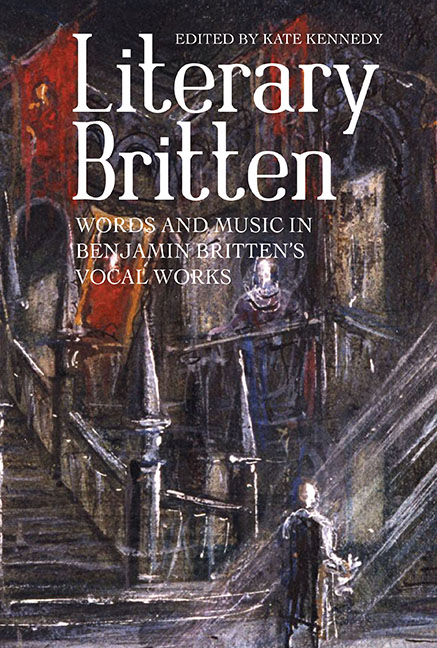Book contents
- Frontmatter
- Contents
- List of Illustrations
- List of Music Examples
- List of Contributors
- Introduction
- Part I Perspectives
- 1 Britten and His Librettists: The Composer as Auteur
- 2 Britten, Auden and the 1930s
- 3 James, Britten, Piper and the Literary Supernatural: The Changing ‘vision of evil’ in The Turn of the Screw and Owen Wingrave
- 4 ‘Thought's Wildernesses’: The Development of Britten's Nocturne from Library to Score
- 5 ‘Reading at Intervals’: Britten's Romantic Poetry
- 6 Britten's Drops: The Lyric into Song
- 7 ‘Without any tune’: The Role of the Discursive Shift in Britten's Interpretation of Poetry
- 8 Britten and Modern Tragedy
- Part II Studies
- Bibliography
- Index
7 - ‘Without any tune’: The Role of the Discursive Shift in Britten's Interpretation of Poetry
from Part I - Perspectives
Published online by Cambridge University Press: 17 July 2019
- Frontmatter
- Contents
- List of Illustrations
- List of Music Examples
- List of Contributors
- Introduction
- Part I Perspectives
- 1 Britten and His Librettists: The Composer as Auteur
- 2 Britten, Auden and the 1930s
- 3 James, Britten, Piper and the Literary Supernatural: The Changing ‘vision of evil’ in The Turn of the Screw and Owen Wingrave
- 4 ‘Thought's Wildernesses’: The Development of Britten's Nocturne from Library to Score
- 5 ‘Reading at Intervals’: Britten's Romantic Poetry
- 6 Britten's Drops: The Lyric into Song
- 7 ‘Without any tune’: The Role of the Discursive Shift in Britten's Interpretation of Poetry
- 8 Britten and Modern Tragedy
- Part II Studies
- Bibliography
- Index
Summary
In his seminal work on the subject of Britten's collaborations with W. H. Auden, Donald Mitchell asserted, ‘[his] music can embody an attitude, a point of view, which need not necessarily be part of the meaning of the original text’. Of course, the ability of music to convey extra-musical meaning, even when text is present, is not without controversy and has sparked fierce debates. Mitchell's language, however, carefully avoids much of the charged terminology that equates music with language: instead of signifying, music here ‘embod[ies]’, a rather safe formation that seems to reside more in the realm of character attributes than of semiotics. It is what Britten's music embodies, according to Mitchell, that becomes more problematic. Rather than merely communicating the poetic text, his music expresses an extrinsic ‘attitude’ or ‘point of view’ about the poem's subject matter. Taken further, this notion suggests that, similar to the subtle nuances in language used by a speaker or writer to express an implied meaning in a discourse, the composer is able to lead the listener through his setting of a text by musical means. Put another way, Britten affects a listener's understanding of the text through his musical discourse.
Melody, as the vehicle of the text, is at the forefront of the discursive code for Britten's text setting. Indeed, the melodic shapes he chooses for expressing and interacting with the text are fundamental to our apprehension of his interpretation. As Peter Pears observed in a discussion of the ‘Prologue’ to Britten's Our Hunting Fathers, ‘[Britten] can match the thorniest epigrams with an apt and memorable phrase’, continuing, ‘the musical motto (major to minor triad) well fits the poet's theme: “O pride so hostile to our charity”.’ The phrase in question, at bars 19–20, slithers downward chromatically and narrowly through major and minor seconds – a gesture that ‘matches’ the text through its mimicry of the inevitable fall (descent) from pride and its allusion to the serpent of original sin. A concurrent shift in register guides the listener toward the gesture, effectively ensuring that the phrase will be, in Pears's words, ‘memorable’. The composer's careful attention to melodic shape and detail, in this instance, points the discerning listener toward this clarifying moment in W. H. Auden's prologue.
- Type
- Chapter
- Information
- Literary Brittenwords and music in benjamin britten's vocal works the boydell, pp. 144 - 170Publisher: Boydell & BrewerPrint publication year: 2018



